
BAAINBwBundesamt für Ausrüstung, Informationstechnik und Nutzung der Bundeswehr, an important “fighter” against the Coronavirus
Procurement- Date:
- Reading time:
- 8 MIN


The procurement of medical material for the fight against the Coronavirus is currently an additional and important task for BAAINBwBundesamt für Ausrüstung, Informationstechnik und Nutzung der Bundeswehr. The staff of the Federal Office of Bundeswehr Equipment, Information Technology and In-Service Support procure urgently required consumables for the health care system of the Federal Republic of Germany and for the Bundeswehr.
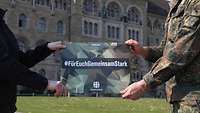
Civilian and military employees work hand in hand
Bundeswehr/Carina GrawitterCurrently, the so-called “Personal Protective Equipment Working Group” at BAAINBwBundesamt für Ausrüstung, Informationstechnik und Nutzung der Bundeswehr receives about 300 e-mails a day. Requests for official assistance from the Federal Ministry of Health and Bundeswehr requirements are processed with the cooperation of experienced lawyers and civil servants from the field of purchasing (E2), the medical experts from the “support” (U7) division and the Central Coronavirus point of contact (ZACvZentrale Ansprechstelle Coronavirus), which includes reviewing and checking the numerous offers from all over the world.
Apart from a great variety of materials, personal protective equipment and medical equipment, the focus is on procuring disinfectants and medicine. Marion Zekorn is chief of division at BAAINBwBundesamt für Ausrüstung, Informationstechnik und Nutzung der Bundeswehr and as one of the people in charge of purchasing, she can confirm that contracts for large quantities of hand sanitizer have been concluded. “Apart from that we managed to place contracts for large quantities of disposable gloves, surgical masks, disposable protective goggles, FFP2 masks and many other products within a very brief period of time. And this in spite of the fact that the market is complex and chaotic,” Zekorn adds
The first point of contact are suppliers and contractors already known to the Bundeswehr who deal in the required materials. Apart from further market research, many offers reach the Federal Office by different routes. All offers are evaluated for their technical quality and contractual principles by the Personal Protective Equipment Working Group. “In this overactive market, not only do we get bizarre offers but also bizarre bidders,” says one of the lawyers temporarily based here. “Currently there is no normal market worldwide. We receive hundreds of sometimes dubious unrequested offers every week. Shops selling hair extensions suddenly offer face masks. In these cases we also have to check the bidders’ credibility,” is how she describes the current situation.
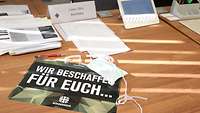
Not just a slogan but everyday reality
Bundeswehr/Carina GrawitterApart from procurement for the Bundeswehr, particularly the requests from the Federal Ministry of Health for very large quantities are a challenge. Several requests for administrative assistance from the Federal Ministry of Health are the basis for the procurement of personal protective equipment. Since the beginning of March, these requirements have been processed with a high priority in cooperation with the procurement agencies of the Finance Ministry and the Ministry of the Interior.
The supply chains posed a major challenge in this context. A major part of the required products is manufactured in the Far East. From there they are shipped to Germany via air transport. Flights are scarce and expensive at the moment. Only a very limited influence can be exerted on the suppliers’ logistics. Delivery failures or late deliveries must be constantly monitored in order to satisfy the urgent demand with alternatives if required.

Explaining the challenges of procurement: Senior civil servant Eva-Christina Blum (right) and BAAINBwBundesamt für Ausrüstung, Informationstechnik und Nutzung der Bundeswehr chief of division Marion Zekorn
Bundeswehr/Carina Grawitter“Especially face masks are currently traded like precious raw materials at the stock market,” says Eva-Christina Blum, one of the two heads of the Procurement Working Group.
The frequently short validity periods cause difficulties and quite often advance payment is requested. “Considering our responsibility for spending taxpayers’ money, our scope of action is very limited here,” Blum adds.
Subsequent to the initial evaluation by the legal experts, the offered products, which are mainly produced in China, are technically assessed. The decisive criteria are certification and usability for the German market. The experts in charge at BAAINBwBundesamt für Ausrüstung, Informationstechnik und Nutzung der Bundeswehr are members of the “Military Pharmacy, Medical Facilities and Medical Equipment” Group and are closely involved in the procurement of these products.
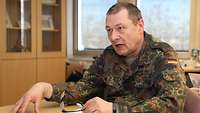
Colonel, Pharmacy Corps Dr. Ullrich Kindling explains the range of equipment to be procured
Bundeswehr/Dirk BannertColonel, Pharmacy Corps Dr. Ulllrich Kindling is responsible for the procurement of drugs and medicinal products for the Bundeswehr. “Not only do we procure personal protective equipment and fever thermometers but also ventilators, X-ray equipment and equipment for detecting viral infections for the Bundeswehr hospitals,” says the 58-year-old.
Lieutenant Colonel, Pharmacy Corps René Schliebener is one of the experts in this field. “We carry out the technical assessments of the items procured in the context of a request for assistance from the Federal Ministry of Health,” says the pharmacist. The high number of offers from abroad we are currently receiving is a special challenge. Apart from Coronavirus-related procurement, his day-to-day business, the regular use of medical systems in the Bundeswehr, continues.
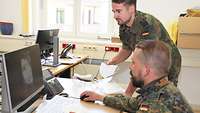
The technical examination of the bids is of particular importance.
Bundeswehr/Dirk BannertIf the technical assessment yields a positive result, the contract is drafted. The bidder must submit a proposal. Subsequent to its arrival, Division E2 and the working group for the procurement of personal protective equipment conclude the contract. The contract, which was reduced to a minimum due to the crisis, is about two pages long. The contract becomes valid with the signature of the contract parties.
After the legal and technical assessments, things can still go wrong. Some bids arrive late or not at all. There are numerous reasons for this, such as different time zones. At times the items are no longer in stock or another buyer bought them as a blind bargain. Or perhaps the supplier is dissatisfied with the conditions.
The required products should be procured as quickly as possible and subsequently delivered. Due to the urgency of the matter, exceptions in contracting law were quickly defined during the Corona crisis so that all opportunities to accelerate the process were used. Competitive bidding is suspended, direct agreements and bilateral negotiations of the contract conditions with the suppliers make the process very fast. Within a short time, BAAINBwBundesamt für Ausrüstung, Informationstechnik und Nutzung der Bundeswehr alone managed to conclude nearly 70 contracts with a total value of 340 million euros.
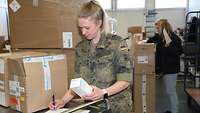
There have to be controls. Every delivery is checked
Bundeswehr/Dirk BannertNot all suppliers send the signed contract back to Koblenz. The BAAINBwBundesamt für Ausrüstung, Informationstechnik und Nutzung der Bundeswehr staff have to learn to be patient here sometimes. Renegotiations at up-to-date prices or stock that has meanwhile been sold are only two possible reasons for delays.
The contracts concluded ensure that new, urgently required medical material is delivered to Germany. However, the work of the BAAINBwBundesamt für Ausrüstung, Informationstechnik und Nutzung der Bundeswehr staff is not completed at this point. The next steps are system maintenance and delivery tracking. Master data teams enter all data into the SAP system. Only if all data is entered correctly, can the material be recorded after delivery. At the same time, they keep in touch with the contract partners and check the delivery status.
When a delivery arrives at a Bundeswehr depot, the material is recorded by the Bundeswehr Logistics Command. BAAINBwBundesamt für Ausrüstung, Informationstechnik und Nutzung der Bundeswehr sends a report about this to all agencies involved. If no delivery is received at the contractually agreed date, the contract experts contact the supplier and try to clarify the situation.
In order to assess the situation in general, the BAAINBwBundesamt für Ausrüstung, Informationstechnik und Nutzung der Bundeswehr management and the various situation centers of the FMOD and the Federal Government require up-to-date and clear situation pictures. The Coronavirus central point of contact at BAAINBwBundesamt für Ausrüstung, Informationstechnik und Nutzung der Bundeswehr is responsible for this. This is where all reports are collected and subsequently summarized and consolidated to form a major situation picture.
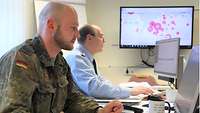
This is where all the threads converge: Central Coronavirus point of contact at BAAINBwBundesamt für Ausrüstung, Informationstechnik und Nutzung der Bundeswehr
Bundeswehr/Dirk BannertIt is also essential for the management to have an overview of suspected cases and infections within the organizational element Equipment, Information Technology and In-Service Support (AINAusrüstung, Informationstechnik und Nutzung).
Major Cliff Ellenberger points out the significance of the Coronavirus central point of contact. “The task spectrum is large. Beginning with individual care for infected members of staff up to the immediate communication with the situation center at the FMOD.”
The Coronavirus point of contact provides support to patients and their families with the cooperation of the professional psychology department. It is also the point of contact for the Bundeswehr Territorial Command, the Bundeswehr Joint Medical Service and other agencies.
Technical personnel with specialized medical background knowledge is rare. Support is provided by many other branches of the agency. “At present, we work long hours. One colleague is a single mother and has two children. Not only did she work in her complex field of tasks in an exemplary manner, she also looked after her children who had schoolwork to do!” says one of the lawyers. “The phones are ringing every minute and this does not even stop on weekends or holidays. The phones are answered because the staff is generally on call.”
We extensively dealt with all aspects of the Coronavirus as early as February and we set up the central point of contact at the same time so that we were in a good position,” emphasizes Gabriele Korb, Director-General of BAAINBwBundesamt für Ausrüstung, Informationstechnik und Nutzung der Bundeswehr.

Gabriele Korb, Director-General of BAAINBwBundesamt für Ausrüstung, Informationstechnik und Nutzung der Bundeswehr, is very satisfied with the work of her staff.
Bundeswehr/Dirk Bannert“When the first request for administrative assistance reached us at the beginning of March, we were able to start work immediately due to the task force we had set up.” The health of her staff and their families is particularly close to her heart. “Balancing the protection of our staff and the additional tasks while continuing to perform our original tasks is still a challenge. I am very proud of my staff, not just those staff members who are involved in handling the Corona crisis but also all others who work reliably under difficult circumstances,” says Korb.